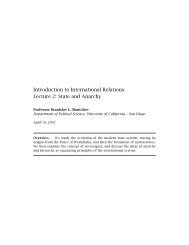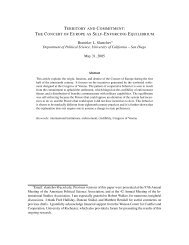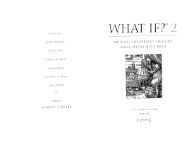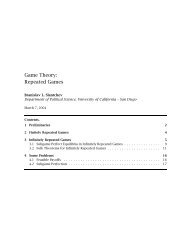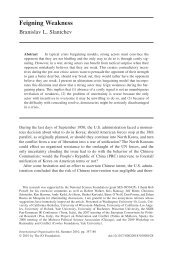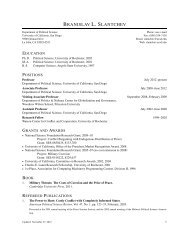Introduction to International Relations Lecture 10 - Branislav L ...
Introduction to International Relations Lecture 10 - Branislav L ...
Introduction to International Relations Lecture 10 - Branislav L ...
You also want an ePaper? Increase the reach of your titles
YUMPU automatically turns print PDFs into web optimized ePapers that Google loves.
permanently overshadowed.<br />
This “vicious circle of security and power accumulation” is called the security<br />
dilemma, and it means that in a self-help system one cannot simultaneously<br />
improve one’s own security without reducing that of others. That’s because the<br />
extent of one’s security is always the extent of the insecurity of one’s opponent.<br />
This dilemma characterizes the tension between deterrence and reassurance: If<br />
an ac<strong>to</strong>r seeks <strong>to</strong> enhance the credibility of his deterrent threat, he will generally<br />
improve his military capabilities and engage in actions that, by definition, would<br />
greatly reduce the security of his opponent, which in turn destroys the reassurance<br />
measures and frightens the opponent in<strong>to</strong> actions designed <strong>to</strong> counteract<br />
his deteriorating security position.<br />
It is important <strong>to</strong> note that the security dilemma does not operate everywhere<br />
and at all times. With respect <strong>to</strong> friends, arming does not trigger a corresponding<br />
counter-arming. This has a lot <strong>to</strong> do with the amount of trust between<br />
the two ac<strong>to</strong>rs, especially when they share common culture and values because<br />
these improve communications and reduce the chances of misperception. Take,<br />
for example, Canada and the United States: there is no security dilemma between<br />
them. It’s not that the Americans did not contemplate the conquest of<br />
their Northern neighbor once (early 1800s), and it’s not that they did not attempt<br />
it (during the War of 1812). But it seems that Canada is not busy building<br />
defenses against an American invasion, and the Americans do not lose much<br />
sleep over what their vaguely socialist neighbors <strong>to</strong> the North are up <strong>to</strong>. Although<br />
it is perhaps safe <strong>to</strong> say that satisfaction with the status quo is one<br />
reason for not turning Canada in<strong>to</strong> the 51st state, it is more important <strong>to</strong> realize<br />
that such conquest is not even contemplated. That is, it’s not like every year<br />
the U.S. war council gathers <strong>to</strong> decide whether <strong>to</strong> spare the Canadians for twelve<br />
more months. Use of force does not appear <strong>to</strong> be a conscious possibility in the<br />
relations between the two countries. This is crucial, and it also happens <strong>to</strong> be<br />
a feature of transatlantic relations with countries like Britain that only recently<br />
(by his<strong>to</strong>rical standards) were enemies. We shall return <strong>to</strong> this phenomenon<br />
when we discuss the democratic peace.<br />
Before we consider ways in which potential opponents can cope with the security<br />
dilemma, it is worth asking an important question: If everyone knows about<br />
the dilemma, then why do states still build arms? Are leaders such morons<br />
that they cannot see how their individual behavior is causing the very problems<br />
they are trying <strong>to</strong> overcome? If two ac<strong>to</strong>rs both want peace and security, why<br />
do they engage in actions that make escalate tensions and make war a distinct<br />
possibility?<br />
You should note that nowhere in the preceding paragraphs did we assume<br />
that either ac<strong>to</strong>r was bent on expansion or revisionism. We only assumed that<br />
because no one can credibly promise never <strong>to</strong> attempt <strong>to</strong> change the status quo,<br />
there is a certain amount of uncertainty about the intentions of the other ac<strong>to</strong>rs.<br />
They may or may not be revisionist. But on the slight chance that they are,<br />
one has <strong>to</strong> take measures <strong>to</strong> guard against such an eventuality. The moment<br />
4



